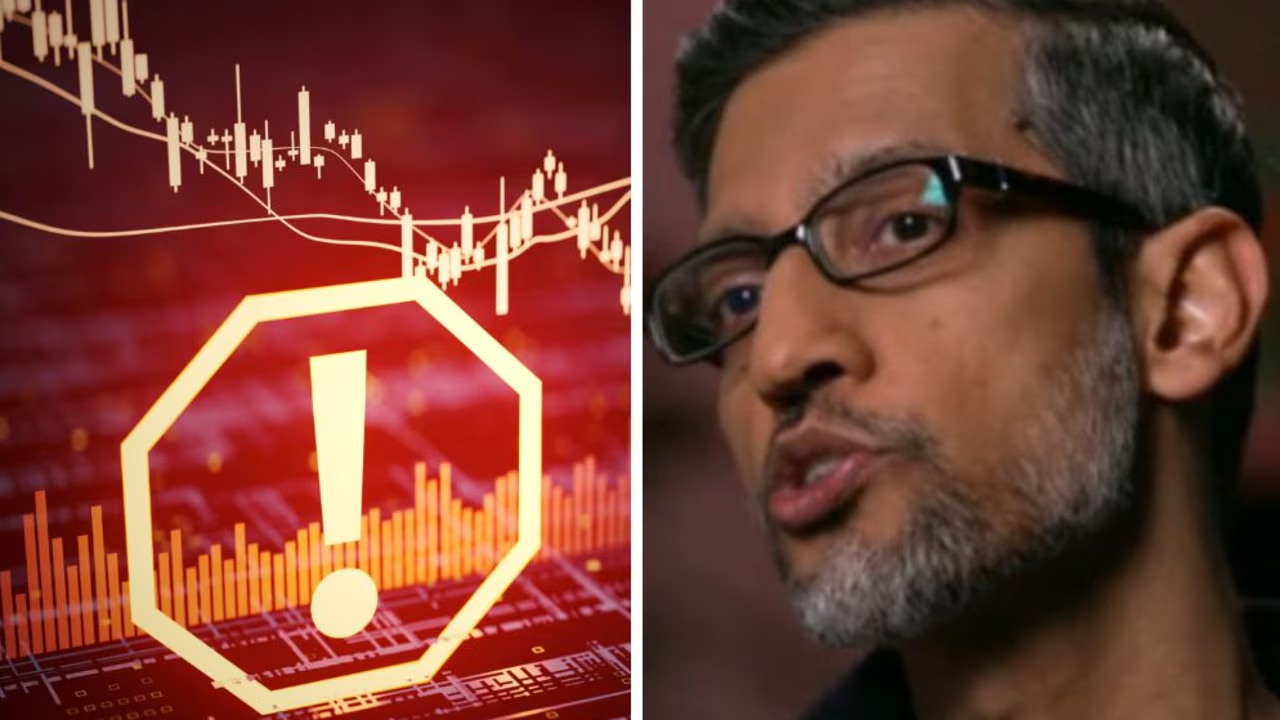Google CEO’s astonishing AI comment stuns

The man at the helm of one of the world’s most powerful tech empires believes no one on the planet will walk away untouched if the AI hype bubble pops.
The hype surrounding the future of AI has driven astronomical gains in the US tech sector as investors flock to what some are describing as the “new renaissance”. It’s largely been responsible for North America’s economic growth over the past two years.
But it has also naturally driven a chorus of scepticism, with some comparing it to the catastrophic dotcom bubble burst.
Speaking to BBC News at Google’s headquarters in California, Alphabet CEO Sundar Pichai gave his tech peers a reality check amid the frenzy, which has seen several competitors announce new multi-billion dollar data centres over the past six months. The speculation and excitement over exactly what AI could turn into (and how much money it could generate) has driven an investment surge of biblical proportions.
While Pichai describes the boom as an “extraordinary moment,” he warns it is also one laden with irrationality.
Silicon Valley has seen this movie before. Sky-high valuations, vast spending, and a gold-rush mentality have triggered growing chatter that the sector may be inflating faster than reality can support.
Analysts are now questioning whether the industry is drifting into dangerous territory. If one pillar collapses, the perceived value of the others might crumble with it immediately.
Pichai was asked whether Google could emerge unscathed if the AI bubble burst, and his answer was bleak, contrary to what most bullish CEOs might have said.
“I think no company is going to be immune, including us,” he admitted.
Alphabet’s own meteoric rise forms part of the backdrop. In just seven months, the company’s market value doubled to US$3.5 trillion (AU$5.40 trillion), boosted by investor confidence that Google can hold ground against OpenAI, maker of ChatGPT.
Meanwhile, Alphabet’s push into custom AI superchips pits it directly against Nvidia, which recently became the first company to hit a US$5 trillion (AU$7.72 trillion) valuation. That figure means it is technically “worth” more than 37 developed nations around the world.
Lying behind those gargantuan numbers is a tangle of almost US$2 trillion in deals connected to OpenAI. That figure has attracted scepticism because it dwarfs the company’s expected annual revenue. The actual number is forecast to be less than a thousandth of that amount, making even the most seasoned of market speculators uneasy.
Pichai suggested investors may have forgotten the lessons of the dotcom bust and could be racing ahead of reality, claiming tech investment cycles often “overshoot” when something new and useful materialises out of nowhere.
“We can look back at the internet right now. There was clearly a lot of excess investment, but none of us would question whether the internet was profound,” he said.
The disruptive decade
Pichai is not alone in his criticism of the current state of global economics. Just last month, the head of America’s largest bank similarly warned that the risk of a collapse was currently higher than most believed possible.
Jamie Dimon, Chief Executive of JPMorgan, claimed he’s “far more worried than others” about the possibility of a significant market correction within the next six months to two years.
The word of the decade is “disruption”, and the AI boom is creating a very uneasy atmosphere among anyone who isn’t a large company owner.
Predictions vary on exactly when mass automation will fully take hold, with governments facing increasing pressure to get ahead of the curve before the real crisis hits.
Dimon’s warnings branched further than just AI, however. He also claims the United States has become a “less reliable” player on the world stage amid rampant inflation and strained alliances between Western powers.
He remains confident that the Federal Reserve would remain independent despite pressure from the Trump administration, but remains certain humanity “doesn’t know how to answer” the sheer breadth of issues that have severe implications on the global economy.
Dimon stressed that investors should treat the current environment as unusually volatile, suggesting that some of his peers were asleep at the wheel.
“The level of uncertainty should be higher in most people’s minds than what I would call normal,” he said.
“The way I look at it is AI is real, AI in total will pay off,” he said. “Just like cars in total paid off, and TVs in total paid off, but most people involved in them didn’t do well.”
Dimon has also been very vocal on security concerns, warning earlier this year that the US could exhaust its missile stockpile within a week in a conflict in the South China Sea.
“People talk about stockpiling things like crypto,” he remarked. “I always say we should be stockpiling bullets, guns and bombs. The world’s a much more dangerous place, and I’d rather have safety than not.”
Those comments are now aligning with certain fringe internet economists, who have for years warned that the current economic model is resting on a knife’s edge.
Drawing on divergence in sentiment surveys and long-term trends in real income growth, Bravos Research argues that a crash is historically feasible.
The research firm opens with what it describes as an unprecedented chart comparing two sentiment surveys. It showed that consumer confidence in the stock market is near its highest levels in over 30 years. Still, sentiment about personal economic prospects is languishing near levels seen during the 2008 financial crisis.
People are optimistic about markets but deeply pessimistic about their own future finances. Bravos sees the disparity in sentiment as a warning sign as investor “euphoria” decouples from real economic expectations.
In blunter terms, it points to a crippling wealth divide that billions of regular humans will never be able to escape from. Not in the traditional sense, anyway.
Australians are feeling this one harder than most in recent years, with new studies showing our disposable income has dropped more than any other developed nation in the post-Covid inflationary crunch.
Since 2010, real personal incomes have risen only 50 per cent, but the inflation-adjusted return on the S&P 500 has surged nearly 300 per cent, according to Bravos. This figure means that while households consistently feel disappointed and under the pump, asset owners like property magnates and large conglomerates have enjoyed unprecedented gains.
Bravos argues that this gap can’t last indefinitely — the financial economy and asset valuations must eventually realign with the real economy. That is their definition of a potential “reset”.
The International Monetary Fund shares similar sentiments.
In April this year, Pierre‑Olivier Gourinchas, the director of the IMF’s Research Department, warned that we are entering a new economic era, with tariff moves and trade disputes introducing significant uncertainty.
“We are entering a new era as the global economic system that has operated for the last 80 years is being reset,” Gourinchas said.
Read related topics:Google





